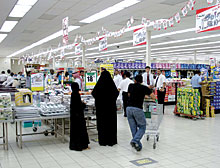JEDDAH, 11 January 2008 — A boycott campaign has popped up. This time it’s not targeting American or Danish products for political or religious motives, but rather to face the current rising prices of basic products.
Since the beginning of 2007, there has been an unprecedented hike in food prices in the Kingdom. Inflation was 2.5 percent last year. Economists predict 4.1 percent in 2008.
A group of activists have called to boycott consumer goods whose prices have risen sharply. An SMS has been distributed recently calling for a boycott of milk products, for example, whose prices have noticeably increased.
“It’s an absolutely natural reaction from people who feel powerless to make any change, especially when there is apperception that authorities aren’t moving enough to supervise the situation and prevent possible commercial fraud,” said Jafer Alkaisy, economic web writer and host of the TV program “Economic Horizons”.
Many consumers believe that local vendors are exploiting inflationary pressures — which has been linked to the riyal’s peg to the weakening US dollar — by increasing prices of goods and services beyond expected levels. The public appears to be growing impatient with the unquestionable and steep rise in the prices of consumer goods.
Alkaisy says there’s a growing perception that some of the price increases are unjustifiable, and boycotts by the public would cause regulators and vendors to notice and perhaps react positively. “The tangible interaction from the public toward this campaign would make it difficult to call it ineffective,” he said.
For the past two months, there has been an online campaign entitled “The National Campaign to Combat High Prices,” which regularly posts lists of products and services that the group says is unjustifiably raising costs beyond the rate of inflation.
A sales manger for a well-known food company, who asked that his name and the name of his employer not be published, said he thinks such campaigns will be ineffective because consumers will be dissatisfied with the low-cost alternative products.
The Riyadh Municipality has recently begun distributing weekly price indicator bulletins every Wednesday in local newspapers.
The bulletin lists the average prices of a basket of 11 basic commodities from eight popular local markets. The purpose of the bulletin is to make public a comparative index that officials believe will put greater pressure on local vendors to remain competitive.
Abdularahman Alzunaidi, an assistant deputy at the Riyadh Municipality, stressed that local officials will impose fines on vendors who provide the city with fake pricing information for the weekly bulletin.


